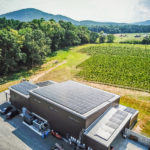Metals Mining: How to Protect Virginia

The Gold Pyrite Belt cuts through the heart of Virginia, running from Northern Virginia deep into Southside. Image credit: Stephani Rinaldi
Mining for gold, copper, zinc, and lead took place in the 19th and early 20th centuries in Virginia. A large-scale version of this toxic industry is now moving forward without a comprehensive regulatory framework nor sufficient financial assurances, putting public health and drinking water at risk.
Virginia’s communities are at risk. We must protect water resources and develop an effective regulatory framework at the state level for mining metals.
How does metals mining harm Virginia’s environment?
Metal mining is the nation’s #1 toxic polluter. The metals mining process is land-intensive, results in perpetual acid mine drainage, pollutes land and water, destroys cultural heritage, and devastates local economies as a result of the boom and bust cycle of the metal mining industry.
Mining companies have been prospecting near Virginia’s gold-pyrite belt for approximately six years. This belt intersects innumerable Environmental Justice communities already overburdened with existing pollution, and now faces the risk of toxic metals mining pollution, too.
The gold-pyrite belt also crosses the James River. The James River serves as the drinking water source for over 2.7 million people, brings millions of dollars into Virginia’s economy from commercial fishing, and attracts over 6 million visitors annually.
Protecting Virginia from Metals Mining
In order to protect people and the Commonwealth’s natural resources, specifically its rivers and streams, Virginia must put in place an effective regulatory framework for mining metals. See the policy recommendations in Our Common Agenda Environmental Briefing Book to protect our waters from Metals Mining.
Thank you to our Network Partners at Appalachian Voices, the Chesapeake Bay Foundation, and Friends of Buckingham for providing expertise on the policy solutions.
Take Action Against Metals Mining
An international prospecting company has proposed bringing large-scale industrial gold mining to the commonwealth, but we don’t have a sufficient regulatory framework or guarantees for safe cleanup. This would leave our communities and water resources vulnerable to pollution. A State Agency Committee is currently reviewing this industry’s potential impacts — and wants your input.
Use the suggested talking points below provided by Appalachian Voices in your comments:
- Regulations have not been updated since the early 1900s, even though the mining process today occurs on a much larger scale.
- Likely sites for new large-scale gold mines would be in close proximity to the James River and its watershed, which provides drinking water for 2.7 million people, brings millions of dollars into Virginia’s economy from commercial fishing, and attracts over 6 million visitors annually.
- Access to clean drinking water sources is a chief concern for many Virginia communities and existing strains for communities would be exacerbated by a new, harmful industry.
- Industrial metals mining, including gold mining, is notorious for polluting water resources.
- Gold mining companies today use cyanide in their metal processing, leaving local communities vulnerable to potential contamination should anything fail during the mining or storage process.
- Of chief concern is the potential health and environmental hazards posed by waste material processing and the waste tailing ponds are susceptible to leaching and spills. Local communities and those downstream could be affected should tailings dams or mining waste depositories fail.










